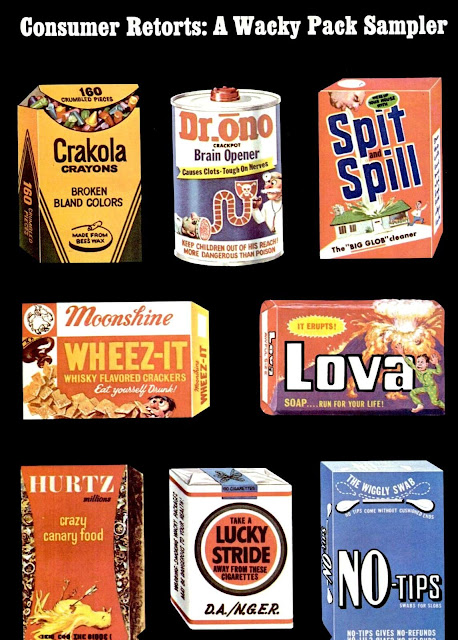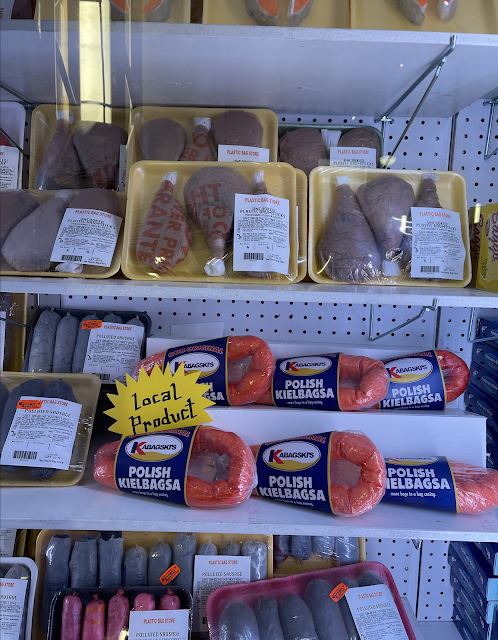You have only through Sunday to see weird, wacky, very fun, but far from frivolous The Plastic Bag Store at the Wrigley Building. The "anchor attraction" of this year's Chicago International Puppet Theater Festival, The store is stocked entirely with very real looking fruit, vegetables, fish and pastries, and packaged goods for parody brands - all made of washed and repurposed plastic bags and trash.
The creation of a team headed by Brooklyn-based designer, puppeteer and filmmaker Robin Frohardt, the installation also includes showing of puppet films - unfortunately sold out - in which an anthropologist far in future works to reconstruct the lost culture of the civilization of "the ancient customers", guided by a note placed in a bottle by Helen, a Met Museum custodian living today, and by the "millions of found artifacts" that are predominantly plastic, which, because plastic doesn't biodegrade, are the most common remnants of our culture to survive.
The Plastic Bag Store that you can visit at the Wrigley is, in concept, that future anthropologists reconstruction of what our society was like.
There's also magazines, and a "time machine" that allows you to put in a plastic bottle today and see what it will evolve into in a thousand years. (Spoiler alert: it's the same plastic bottle.)
The level of creativity is amazing. The vegetables look just like vegetables, flowers, flowers, cakes and cupcakes, real pastries. There's even a deli counter . . .
... and a prodigious selection of packaged goods (be sure to look at the backs) that is truly impressive and inventive . .
It took me back to my childhood, and to the Wacky Packs that were a really big deal among 7-10 year-olds of my generation.
They were inserts trading cards - later stickers - that came with nickel packs of Topps bubble gum that offered up parodies of popular brands and their packaging. For my demographic, they were snarky-fun high-culture.
Originally exhibited in Times Square, it took a year to create the over 10,000 objects in the installation. "I collected bags from friends and family members," says Frohardt in her Youtube video. "I had people save things, I rescued bags the street, I pulled bags from the trash, I pulled them from recycling bins. And then we designed all the packaging. We had to wash every bottle, and label them."
"My aim, "she says, "isn't to make people feel bad. My aim is holding up the mirror and highlighting the absurdity of all this, and fueling the fire of public outage over all this."
Indeed, you won't find any any numbers or charts at The Plastic Bag Store. "I didn't want to overwhelm with statistics," says Frohardt, "but more just wanted to create a kind of familiar, visually tactile experience that [people] could relate to or understand in a more visceral way than just a bunch of numbers."
Still, the facts are staggering:
The world produces 5 trillion plastic bags a year. No more than 3% are recycled. Plastic doesn't biodegrade. It breaks down into ever smaller pieces of itself, with an increasing toxic effect on living things. Parts of north Pacific are estimated to hold six times more plastic than plankton. Ingested as food, often increasingly scarce, it can kill from blocking the digestive system or poking holes in organs. UNESCO estimates 100,000 marine mammals die each year from plastic pollution. Of 61 dead whales found in the Phillipines, 45 of the deaths were traceable to plastic ingestion. One young whale was found to have 88 pounds of plastic in its stomach. The Great Pacific Garbage Patch floating landfill, twice the size of Texas, is mostly made up of plastic.
There are alternatives. I have my own collection of David Lee Csisko reusable bags, "made from 100% post-consumer recycled content . . . the equivalent of three plastic bottles" to cut down on plastic bag use, but sometimes I forget to bring one with me, and I'm back to sin. New York City passed a controversial ban on plastic bags in 2020. In Chicago, we have 7 cent "plastic bag indulgences".
Will we ever get our act in order? Doubtful. Remember that decades ago we had a perfect recycling system for pop - glass Coke, Pepsi, etc. bottles that you paid a deposit on, and returned to the store for a refund, but we were too cheap and lazy to lug the bottles back and forth once we could get our beverages in eternally polluting plastic. "Efficiency," they said. "More hygenic," they said. And we said, ".... yeah, why not!"
So, in summary, we're killing our fellow animals, the environment, the planet, and, eventually, ourselves. But what a way to go!
Again, you have only through this Sunday, January 30th, to see the spectacular The Plastic Bag Store at the Wrigley Building. Frohardt and team will show you a really good time, and you won't even have to think about the sobering implications of her non-guilting, deliciously colorful fun-ride. But plastic leaves an aftertaste, and odds are, sometimes afterwards, you will.










4 comments:
Bring back deposit bottles! Were we kind of too lazy to bring them back...well not at my house. But as a kid, we often made money by taking other people's bottles to the store for them. That's practically all we did with our wagon. Today's kids could be similarly motivated by promises of computer time probably in exchange for certain numbers of bottles.
Les prix étaient très justes pour la qualité du produit que vous obtenez et c'était très amusant de magasiner là-bas! Je vous recommande fortement de les vérifier si vous êtes dans la région ce week-end.
This was such a fun and refreshing post! I love how you captured the playful spirit of the design—it really does feel like architecture that doesn’t take itself too seriously, in the best way. The bold colors and quirky details made me smile. Thanks for spotlighting something so joyful!
Post a Comment